Rock and Roll just seems to have a natural affinity for self-destruction, and, often enough, a rock star’s decline will be spectacular. When they’re not dying in plane crashes, a la Buddy Holly and Lynyrd Skynyrd, they’re crashing cars (Marc Bolan), getting crushed under a bus (Metallica’s Cliff Burton — twice in one night!), or just offing themselves (Johnny Ace, Roy Buchanan, Kurt Cobain, et al). Sometimes they simply drink themselves to death.
We’re not talking about the rock stars who drank and died young, such as that of the hard-boozing Jim Morrison, whose bathtub heart attack at age 27 has longed fueled speculations that his appetite for alcohol and drugs eventually simply stopped his heart. As much as Janis Joplin loved her Southern Comfort, it was heroin that killed her, also at age 27. Certainly booze played a factor in Jimi Hendrix’s death in 1970 — but mostly because he had used it to wash down nine sleeping pills.
We won’t concern ourselves with these famous casualties of the rock and roll lifestyle. Not when there are rockers whose ends came exclusively as a result of hootch. These are the men — and they are all men on this list — for who alcohol was their poison, and had the steely resolve to keep pouring the stuff down their throats until it did them in. Rock and Roll is famous for those who live its hard-drinking lifestyle, and some of them went ahead and died from it.
We give you the men and their drinks, and those of you plucking a scratched up old guitar while sipping Jack and Cokes and dreaming of fame might pause to reflect on them.
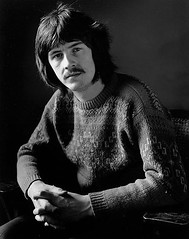 John Bonham: The man behind the ferocious drums on Led Zeppelin’s albums was a former construction worker from Worcestershire, England, with a taste for breaking drumheads. He had an intense dislike of the itinerant life of a rock star, though, and took to drinking shots of vodka. On September 20 of 1980, Bonham, en route to rehearsal for an upcoming tour of America, began binge drinking, downing four quadruple vodkas. He continued drinking throughout the evening, consuming an estimated three-dozen shots of vodka before bedding down at Jimmy Page’s house. By morning, he was dead. The coroner determined that Bonham had died in a manner that seems especially popular among rock stars: He had choked on his own vomit.
John Bonham: The man behind the ferocious drums on Led Zeppelin’s albums was a former construction worker from Worcestershire, England, with a taste for breaking drumheads. He had an intense dislike of the itinerant life of a rock star, though, and took to drinking shots of vodka. On September 20 of 1980, Bonham, en route to rehearsal for an upcoming tour of America, began binge drinking, downing four quadruple vodkas. He continued drinking throughout the evening, consuming an estimated three-dozen shots of vodka before bedding down at Jimmy Page’s house. By morning, he was dead. The coroner determined that Bonham had died in a manner that seems especially popular among rock stars: He had choked on his own vomit.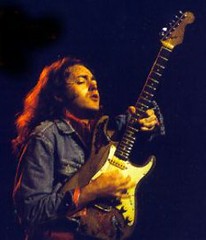 Rory Gallagher: “I wanna try some one hundred percent,” Irish rocker Rory Gallagher sang in a song presciently titled “Too Much Alcohol,” ending the song with the words “Then I won’t feel a thing at all.” Gallagher developed an exceptional reputation as a guitarist and bluesman in the Seventies: He was invited to become a permanent guitarist for the Rolling Stones and took the title of Melody Maker’s Musician of the Year from Eric Clapton in 1972. Gallaghar toured relentlessly, appearing in grueling, marathon performances, one of which was preserved in a film titled Irish Tour ’74. Unfortunately, Gallagher was also a drinker, although he seems to have been unusually discreet about the fact. His consumption was significant enough to destroy his liver: Rolling Stone lists the cause of his 1995 death as being cirrhosis, but most of his other biographers demur from being so explicit, simply stating that Gallagher died from complications brought about by liver transplant surgery. True though that might be, it's an unsatisfactory explanation. After all, Gallagher’s original liver didn’t just go bad all on its own. But if Gallagher’s fans wish to be delicate about the subject of alcoholism, so be it. We do not lack for rockers whose drinking is a public spectacle.
Rory Gallagher: “I wanna try some one hundred percent,” Irish rocker Rory Gallagher sang in a song presciently titled “Too Much Alcohol,” ending the song with the words “Then I won’t feel a thing at all.” Gallagher developed an exceptional reputation as a guitarist and bluesman in the Seventies: He was invited to become a permanent guitarist for the Rolling Stones and took the title of Melody Maker’s Musician of the Year from Eric Clapton in 1972. Gallaghar toured relentlessly, appearing in grueling, marathon performances, one of which was preserved in a film titled Irish Tour ’74. Unfortunately, Gallagher was also a drinker, although he seems to have been unusually discreet about the fact. His consumption was significant enough to destroy his liver: Rolling Stone lists the cause of his 1995 death as being cirrhosis, but most of his other biographers demur from being so explicit, simply stating that Gallagher died from complications brought about by liver transplant surgery. True though that might be, it's an unsatisfactory explanation. After all, Gallagher’s original liver didn’t just go bad all on its own. But if Gallagher’s fans wish to be delicate about the subject of alcoholism, so be it. We do not lack for rockers whose drinking is a public spectacle.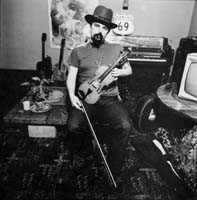 Ron “Pigpen” McKernan: For some reason, it just doesn’t seem like a member of the Grateful Dead should have died from alcohol abuse. After all, this is a band who will forever be associated with the two great countercultural drugs of the Sixties: LSD and marijuana. These drugs were supposed to liberate the spirit; if someone were to die of either (a rare scenario, except for the occasional acid casualty who, convinced he can fly, leaps from a roof), the death should be suitably trippy. After all, wasn’t it at a Dead concert that a fan reportedly simply evaporated in an ecstatic trance? Ron McKernan, known since high school as “Pigpen,” wouldn’t enjoy such a metaphysical end. No, the singer, harmonica player, and organist for the Dead had fashioned an image for himself that drew equally from old timey bluesmen and contemporary bikers, and McKernan’s steered clear of hippie drugs in favor of Thunderbird wine and Southern Comfort. McKernan drank so much that it only took a few years for his liver to begin to fail; he quit alcohol in 1971, but two years later was dead of a hemorrhage in his booze-weakened gastrointestinal tract.
Ron “Pigpen” McKernan: For some reason, it just doesn’t seem like a member of the Grateful Dead should have died from alcohol abuse. After all, this is a band who will forever be associated with the two great countercultural drugs of the Sixties: LSD and marijuana. These drugs were supposed to liberate the spirit; if someone were to die of either (a rare scenario, except for the occasional acid casualty who, convinced he can fly, leaps from a roof), the death should be suitably trippy. After all, wasn’t it at a Dead concert that a fan reportedly simply evaporated in an ecstatic trance? Ron McKernan, known since high school as “Pigpen,” wouldn’t enjoy such a metaphysical end. No, the singer, harmonica player, and organist for the Dead had fashioned an image for himself that drew equally from old timey bluesmen and contemporary bikers, and McKernan’s steered clear of hippie drugs in favor of Thunderbird wine and Southern Comfort. McKernan drank so much that it only took a few years for his liver to begin to fail; he quit alcohol in 1971, but two years later was dead of a hemorrhage in his booze-weakened gastrointestinal tract.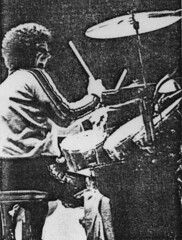 John Panozzo: If pressed, the casual fan of Styx might be able to name its singer and keyboardist, Dennis DeYoung. But this Chicago-based prog rock band from the Sixties and Seventies would not have enjoyed its four consecutive triple platinum albums were it not for the band’s distinctive rhythm section, made up of twin brothers, Chuck and John Panozzo. The band named themselves after the river the dead pass across on their way to Hades, but, for John Panozzo, his passage into the afterworld would be across a river of booze. He died in 1996 of the same cause as Ron McKernan: a hemorrhaged gastrointestinal tract, in this case brought on by a decade of alcoholism that had made it impossible for Panozzo to participate in any of his band’s recordings or tours in the mid-90s. Bandmember Tommy Shaw penned a saccharine ode to Panozzo for the 1997 live album Return to Paradise titled “Dear John,” which included the following lyrics: “Dear John, how are you; God knows its heaven where you are.” Wherever he wound up, one thing is certain: Thanks to his taste for drink, John Panozzo managed to be the first member of his band to actually get to the river Styx.
John Panozzo: If pressed, the casual fan of Styx might be able to name its singer and keyboardist, Dennis DeYoung. But this Chicago-based prog rock band from the Sixties and Seventies would not have enjoyed its four consecutive triple platinum albums were it not for the band’s distinctive rhythm section, made up of twin brothers, Chuck and John Panozzo. The band named themselves after the river the dead pass across on their way to Hades, but, for John Panozzo, his passage into the afterworld would be across a river of booze. He died in 1996 of the same cause as Ron McKernan: a hemorrhaged gastrointestinal tract, in this case brought on by a decade of alcoholism that had made it impossible for Panozzo to participate in any of his band’s recordings or tours in the mid-90s. Bandmember Tommy Shaw penned a saccharine ode to Panozzo for the 1997 live album Return to Paradise titled “Dear John,” which included the following lyrics: “Dear John, how are you; God knows its heaven where you are.” Wherever he wound up, one thing is certain: Thanks to his taste for drink, John Panozzo managed to be the first member of his band to actually get to the river Styx.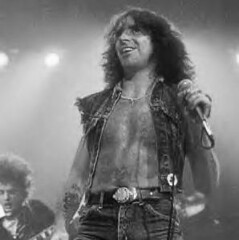 Bon Scott: Prior to taken the reigns as lead singer of the Australian rock band AC/DC, the Scottish-born Ronald Belford Scott had quite a diverse career, including playing in a pipe band, spending several months in a coma after a motorcycle accident, and being rejected by the Australian Army, who claimed he was “socially maladjusted.” The singer, better known as Bon Scott, howled his way through most of AC/DC’s best known albums, singing lascivious ditties that barely qualified as single-entendres, fronting a band best known for noisy, stripped down power chords. As a performer, Scott seemed every inch the wild man, and so, on February 20, 1980, it came as a surprise to nobody when he was found dead in his car after a night of binge drinking. Scott, famously, once sang that “it’s a long way to the top if you want to rock and roll.” Unfortunately, he discovered that, with the help of too much alcohol, it can be a very fast plummet downward.
Bon Scott: Prior to taken the reigns as lead singer of the Australian rock band AC/DC, the Scottish-born Ronald Belford Scott had quite a diverse career, including playing in a pipe band, spending several months in a coma after a motorcycle accident, and being rejected by the Australian Army, who claimed he was “socially maladjusted.” The singer, better known as Bon Scott, howled his way through most of AC/DC’s best known albums, singing lascivious ditties that barely qualified as single-entendres, fronting a band best known for noisy, stripped down power chords. As a performer, Scott seemed every inch the wild man, and so, on February 20, 1980, it came as a surprise to nobody when he was found dead in his car after a night of binge drinking. Scott, famously, once sang that “it’s a long way to the top if you want to rock and roll.” Unfortunately, he discovered that, with the help of too much alcohol, it can be a very fast plummet downward.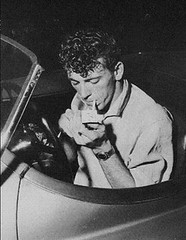 Gene Vincent: Gene Vincent nearly died in 1955. The Virginia-born rockabilly singer responsible for “Be-Bop-a-Lu-La” was in the same car accident that killed Eddie Cochran, a fellow rockabilly now best remembered for the song “Summertime Blues.” The accident left Vincent with a leg brace and constant pain, which might explain why the singer started drinking. Then again, after The Beatles arrived in the United States in 1963, Vincent’s career bottomed out — like many other early rock stars, he languished during the British Invasion. Ironically, the only place Vincent could make a living was in England, and he spent most of the Sixties touring Europe while English pop acts stormed the American charts, which might drive anybody to drink. Vincent’s increased dependence on alcohol sent his health into a steep decline, and he returned to the United States in 1971, where he died in October of a heart attack. Perhaps it would have been best for Vincent had he died in the crash that took Eddie Cochran’s life. It would have spared him years of pain and decline. But Vincent recorded several sides of country music in his last few years of life that are gorgeous and haunted, suggesting that, had liquor not killed him when it did, he might have had a career ahead of him singing honky tonk. Country music would have been a good for Vincent, as it was for fellow disgraced rockabilly star Jerry Lee Lewis. After all, it’s a style of music that encourages singers to weep into their drink and complain of their troubles, and Gene Vincent had troubles to spare. (SPARBER)
Gene Vincent: Gene Vincent nearly died in 1955. The Virginia-born rockabilly singer responsible for “Be-Bop-a-Lu-La” was in the same car accident that killed Eddie Cochran, a fellow rockabilly now best remembered for the song “Summertime Blues.” The accident left Vincent with a leg brace and constant pain, which might explain why the singer started drinking. Then again, after The Beatles arrived in the United States in 1963, Vincent’s career bottomed out — like many other early rock stars, he languished during the British Invasion. Ironically, the only place Vincent could make a living was in England, and he spent most of the Sixties touring Europe while English pop acts stormed the American charts, which might drive anybody to drink. Vincent’s increased dependence on alcohol sent his health into a steep decline, and he returned to the United States in 1971, where he died in October of a heart attack. Perhaps it would have been best for Vincent had he died in the crash that took Eddie Cochran’s life. It would have spared him years of pain and decline. But Vincent recorded several sides of country music in his last few years of life that are gorgeous and haunted, suggesting that, had liquor not killed him when it did, he might have had a career ahead of him singing honky tonk. Country music would have been a good for Vincent, as it was for fellow disgraced rockabilly star Jerry Lee Lewis. After all, it’s a style of music that encourages singers to weep into their drink and complain of their troubles, and Gene Vincent had troubles to spare. (SPARBER)Discuss this story in our forum.

 2 oz. whiskey
2 oz. whiskey
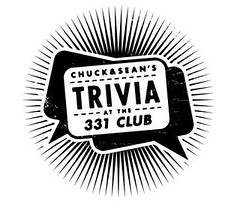

4 comments:
I officially love this blog post.
Go Bottle Gang!
ROCK ON THE DRUMMERS JOHN ...... TWO OF MY FAVORITE DRUMMERS IN HISTORY ... R.I.P. !!!!!!!!!!!
I miss you PIG!!!!!
Actually, the first Stygian to die was John Curulewski in 1988, although he wasn't a "current" member of Styx at the time, having left the group in 1975 after completion of the band's fifth album, Equinox.
Post a Comment